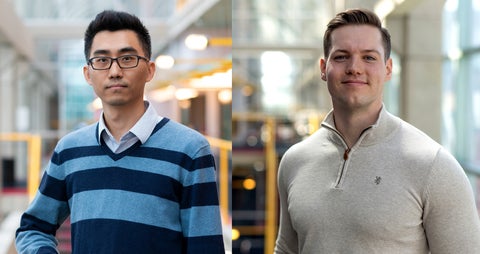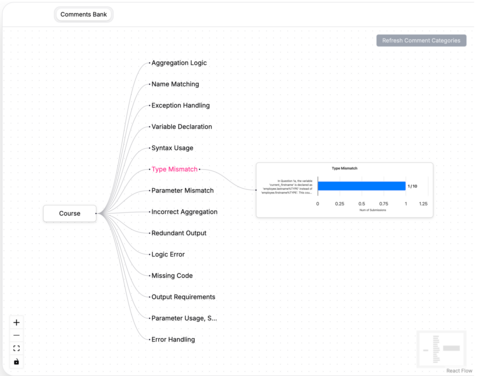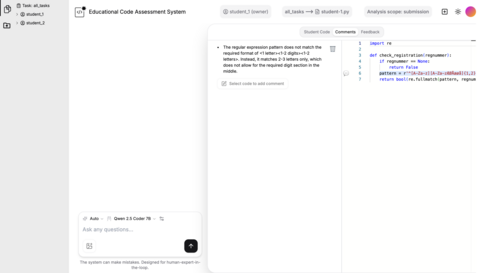Coming from a family of teachers, Norwegian exchange student Christian Garmann Sørli has long been interested in using technology to support human intelligence.
Through the International Work-Integrated-Learning in Artificial Intelligence (IWIL AI) program, a joint initiative between the Norwegian University of Science and Technology (NTNU) and the University of Waterloo, Christian is leveraging AI to enhance and accelerate student learning.

Christian Garmann Sørli (right) is a master’s student at the Norwegian University of Science and Technology (NTNU). In January, he came to the University of Waterloo for an exchange work term, where he explored the intersection between AI and education alongside Professor Jian Zhao (left). | Photo credit: Joe Petrik
It’s often difficult for computer science instructors to deliver personalized and constructive feedback due to the sheer size of classes. For example, the largest computer science class at Waterloo and NTNU have around 800 and 1,500 students, respectively. Coding assignments are submitted weekly, so grading must be completed promptly. As a result, this limited feedback prevents students from valuable learning opportunities. Another challenge is ensuring fair grading since these classes are split into multiple sections, with a different teaching assistant (TA) assigned to each.
To address these issues, Christian, along with his supervisor Professor Jian Zhao and Purdue University’s Professor Tianyi Li and PhD student Yuzhe Zhou, have co-developed an AI tool that can personalize, standardize and scale feedback for computer science coding assignments. Through this tool, humans and AI can co-create feedback by using a smart comment bank that blends efficiency with oversight. For example, it can flag common coding mistakes and suggest comments from a pool of approved comments. By aiming to reduce grading time, instructors can focus on providing meaningful and tailored feedback, such as strategies, that help students progress.

The AI tool can scan coding assignments and create a tree diagram that pinpoints any mistakes and areas of improvement. For example, the student made a “type mismatch” error, where they assigned someone’s first name as their last name.
However, the true focus of Christian’s research is the interactions between AI and humans throughout the grading process. His team is mainly using this tool to explore and understand these dynamics.
Christian will continue this project as part of his master’s thesis, which generally focuses on the development and use of AI-based support systems in computer education. Namely, he will integrate this AI tool with NTNU and analyze its results for a future research collaboration with Waterloo.

This image shows the AI proposing a comment for a Python assignment. TAs can edit, approve, or delete any suggested comments. They can also reuse existing ones from the shared comment bank.
Importantly, this tool isn’t meant to replace teachers but rather to support them.
“The human is always in charge of the tool and that’s a big part of making AI ethical and trustworthy. So, they just adjust and approve the AI suggestions. It’s like smart assistance that helps teachers focus on what really matters: helping students learn.”
Christian and his team have conducted experiments with a group of TAs and professors. What surprised Christian was the “widespread need for feedback consistency.” Many teaching assistants use their own rubrics and comment banks, but there’s no standardized way to manage these evaluations at scale.
“It was also interesting to see how much they want AI to spot common errors and even detect AI-generated code. It showed me that AI in education isn’t just a future idea, it's something educators actively need help with right now.”
Thanks to the IWIL AI, Christian can fulfill his lifelong goal of creating technology that can support human learning. Launched in 2022, the IWIL AI aims to drive AI research through international collaborations. Every year, Waterloo sends 24 co-op students and NTNU sends 12 graduate students to Waterloo. By expanding the AI talent pool, Waterloo and NTNU are propelling the research community to tackle the world’s most pressing and daunting challenges.
Despite not having a background in AI and human-computer interaction (HCI) research, Christian excelled in the program.
“My main research area is algorithms, but over time I developed an interest in AI. I applied to this program because I wanted to bridge my technical knowledge in AI. It stood out because it combines research with real-world applications, especially in education.
“I don’t want people to be deferred from this program by not having an AI specialization. If you’re curious, motivated and have some foundation skills, this program is a great opportunity to explore AI in a supportive and research-driven environment. You will learn a lot by collaborating with people from different backgrounds.”
This program was too good to pass up, since visiting Canada was always on Christian’s bucket list.
Throughout his four-month stay, he was amazed by Canadians’ warm and kind nature from holding the door for strangers to their tendency to over apologize, and the country’s beautiful landscape. Some highlights include visiting Banff National Park during a long weekend.
“The most unforgettable moment was seeing a wolf up close. We were just walking on the path and all of a sudden a wolf came 10 metres away. The nature in Canada is just stunning and I really enjoyed exploring it in my free time.”
This program didn’t just expose Christian to exciting research endeavours and international travel.
“If you’re interested in an exchange or an international experience, do it— even if it feels outside your comfort zone. Not only will you gain academic experience, but also personal growth. It will broaden your perspectives and lifelong connections.
“My advice is: come in with an open mind and don't be afraid to ask for help. You're not expected to know everything.”